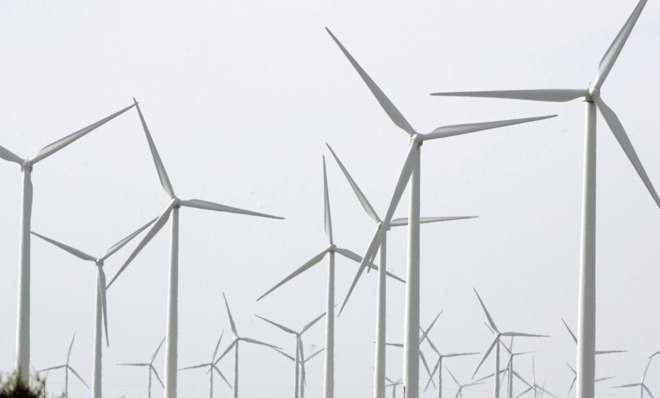It's time for wind power to stand or fall on its own
After two decades of generosity, wind power subsidies should be allowed to expire at the end of the year

A free daily email with the biggest news stories of the day – and the best features from TheWeek.com
You are now subscribed
Your newsletter sign-up was successful
Federal subsidies for wind energy are set to expire at the end of the year. Again.
Since 1992, the Production Tax Credit (PTC) has offered generous federal subsidies to wind generators. Under the policy, wind generators are eligible for 2.3 cents in taxpayer subsidies for each kilowatt hour (kWh) of wind electricity generated. That's nearly a third of the total retail price of electricity for industrial customers.
Federal subsidies for wind are so lavish, that generators in places like west Texas (where wind is plentiful) have been known to bid electricity onto the grid at negative prices, just so it can collect the larger subsidy amount and pocket the difference. Negative pricing is a great deal for whoever owns the generator, but can play havoc with electrical reliability, by undercutting other power sources and discouraging investment in new capacity.
The Week
Escape your echo chamber. Get the facts behind the news, plus analysis from multiple perspectives.

Sign up for The Week's Free Newsletters
From our morning news briefing to a weekly Good News Newsletter, get the best of The Week delivered directly to your inbox.
From our morning news briefing to a weekly Good News Newsletter, get the best of The Week delivered directly to your inbox.
Yet despite literally paying people to take their electricity, wind power represents just 3.5 percent of all electricity generation in the United States. The big problem is not so much cost as reliability. Wind power is intermittent; it has a nasty habit of stopping, sometimes on a moment's notice. And since there is no commercially viable means of storing electricity, use of wind power requires the existence of back-up power plants (typically natural gas) that can be ramped up or down depending on which way the wind blows. This sort of redundancy is not only inefficient, but emissions levels are higher during the process of ramping a gas plant up and down, cancelling at least part of the environmental benefits of using wind. No amount of subsidies for generators will solve these problems, and, in fact, subsidies could serve to aggravate it by undercutting the profitability of back-up sources of power.
Even in Europe, where wind subsidies can be even more lavish (and where electricity prices are far higher) than in the United States, intermittency poses an insurmountable problem. A study by the Danish think tank CEPOS, for example, found that while wind generators managed to generate the equivalent of 19 percent of Denmark's total electrical demand, wind accounted for less than 10 percent of electrical consumption.
The PTC was initially billed as a temporary measure designed to encourage the development of wind electricity until it was ready to compete with other energy sources. The temporary nature of the PTC, however, has in practice tended to be a bit of a mirage. Each time the PTC is set to expire, wind lobbyists turn up to argue that the industry just needs a little more time to mature, and the credit ends up getting a stay of execution. The latest such reprieve came at the end of last year, when a one year extension of the PTC for wind was slipped into the fiscal cliff deal.
This time should be different. If wind isn't competitive after more than two decades of federal support, there's no reason to think that a few more years will change that, particularly when many states offer additional subsidies and mandates for renewable energy. Instead of trying to protect wind from competition, the federal government should step aside and let the industry find its own niche in the market.
A free daily email with the biggest news stories of the day – and the best features from TheWeek.com
Josiah Neeley is a Policy Analyst for the Armstrong Center for Energy and the Environment at the Texas Public Policy Foundation.
-
 Why is the Trump administration talking about ‘Western civilization’?
Why is the Trump administration talking about ‘Western civilization’?Talking Points Rubio says Europe, US bonded by religion and ancestry
-
 Quentin Deranque: a student’s death energizes the French far right
Quentin Deranque: a student’s death energizes the French far rightIN THE SPOTLIGHT Reactions to the violent killing of an ultraconservative activist offer a glimpse at the culture wars roiling France ahead of next year’s elections.
-
 Secured vs. unsecured loans: how do they differ and which is better?
Secured vs. unsecured loans: how do they differ and which is better?the explainer They are distinguished by the level of risk and the inclusion of collateral